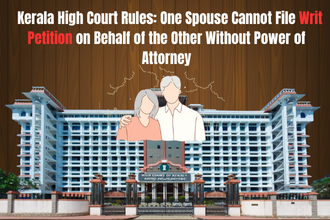In a significant verdict that reinforces the principle of finality in citizenship determinations, the Supreme Court of India has held that a second proceeding before the Foreigners Tribunal against a person already declared an Indian citizen amounts to an abuse of the legal process. The judgment was delivered by a Division Bench comprising Justice Manoj Misra and Justice K.V. Viswanathan in the case Tarabanu Begum @ Tarabhanu Khatun v. Union of India & Ors., [2025 LiveLaw (SC) 527], allowing the appeal and setting aside the Gauhati High Court’s refusal to quash the second tribunal case.
Background of the Case
The case originated in Assam, where the appellant Tarabhanu Khatun was accused of being a foreigner who had illegally entered the state after the cut-off date of 25 March 1971. Under the Foreigners Act, 1946, this date holds significance in Assam due to the provisions of the Assam Accord and the National Register of Citizens (NRC) process. The appellant was initially proceeded against before the Foreigners Tribunal in Nalbari at Mukalmua.
On 31 August 2016, the Tribunal held that Tarabhanu Khatun was not a foreigner, based on substantial documentary and oral evidence. Her submissions included voter lists from 1966 and 1970 listing her parents, her marriage in 1979 to an Indian citizen, and proof that she had been casting her vote since 1985. The State, notably, had failed to produce any witness or evidence to rebut her claims. Based on this, the Tribunal ruled in her favour, discharging the burden of proof under Section 9 of the Foreigners Act.
Despite the conclusive order, a second notice was issued to her on 15 December 2018, initiating a fresh case against her before another Foreigners Tribunal. This led her to approach the Gauhati High Court by way of a writ petition seeking to quash the fresh proceedings.
Gauhati High Court’s Decision
While the High Court acknowledged that Tarabhanu had already been declared not to be a foreigner, it declined to quash the second case. Instead, it held that she could raise all her legal and factual pleas again before the Tribunal. Aggrieved by this, she filed a Special Leave Petition (Civil) No. 24703 of 2023 before the Supreme Court.
Supreme Court’s Observations
The Supreme Court took serious exception to the State’s action of initiating a second proceeding on identical grounds. The Bench observed that the earlier decision had attained finality and was binding, especially since the State had neither challenged the 2016 order nor sought its recall. The Court noted:
“Once it is not in dispute that on a previous reference the Tribunal, after giving opportunity to both sides and on appraisal of evidence, found the appellant not a foreigner, the only course available for the respondent was either to challenge the order before the High Court or seek for its recall… So long the earlier order stands, it is not open to initiate fresh proceedings as the same would be hit by principles of res judicata.”
The Court further cited its own precedent in Abdul Kuddus v. Union of India, reinforcing that the Foreigners Tribunal functions as a quasi-judicial authority and its findings carry binding effect. Therefore, the second case violated the doctrine of res judicata, which prohibits multiple proceedings on the same issue between the same parties once it has been judicially decided.
Abuse of Process of Law
The Supreme Court held that the second proceeding initiated in 2018 was “an abuse of the process of law.” It criticized the High Court for not intervening and allowing such a legally untenable action to proceed. The judgment quashed the second proceeding and overruled the High Court’s order dated 31 May 2023, stating:
“In our view, therefore, the subsequent proceedings were nothing but an abuse of the process of law, and therefore, the High Court ought to have interdicted the same.”
Arguments by Counsels
Senior Advocate P.V. Surendranath, appearing for the appellant, emphasized that once a Tribunal had declared her an Indian, a second proceeding without challenge or review of the first order was entirely illegal. He relied heavily on the Abdul Kuddus judgment.
On the other hand, Advocate Debojit Borkakati, representing the State of Assam, argued that the previous order was “cryptic” and had not properly analyzed the evidence. The Supreme Court rejected this contention, ruling that the validity of a judgment cannot be questioned in a subsequent proceeding if it had not been challenged through appropriate legal remedies.
Legal Significance
This ruling by the Supreme Court holds substantial legal and constitutional significance:
- It reinforces the binding nature of Foreigners Tribunal orders and protects individuals from repeated harassment through multiple proceedings.
- It affirms the principle of res judicata in quasi-judicial proceedings involving citizenship determination.
- It upholds procedural fairness and legal finality, which are cornerstones of rule of law and natural justice.
- It provides a vital precedent for those wrongly subjected to recurring tribunal cases despite having proved their Indian citizenship once.
The decision is especially crucial in the context of Assam and similar regions where questions of citizenship, migration, and NRC-related issues are highly contentious. It ensures that individuals once cleared by a tribunal are not subjected to an endless cycle of scrutiny unless legally permissible review or appeal mechanisms are followed.
Conclusion
The Supreme Court’s judgment in Tarabanu Begum @ Tarabhanu Khatun v. Union of India & Ors. is a strong affirmation of the rights of individuals who have been legally declared Indian citizens. It prevents the arbitrary misuse of Foreigners Tribunal proceedings and safeguards against administrative overreach. By invoking the principle of res judicata and condemning repetitive litigation as an abuse of law, the Court has strengthened the due process protections available to vulnerable citizens caught in prolonged legal battles over their identity.
This ruling is bound to have a far-reaching impact on similar cases across Assam and will serve as a judicial bulwark against procedural excesses in citizenship verification cases.


